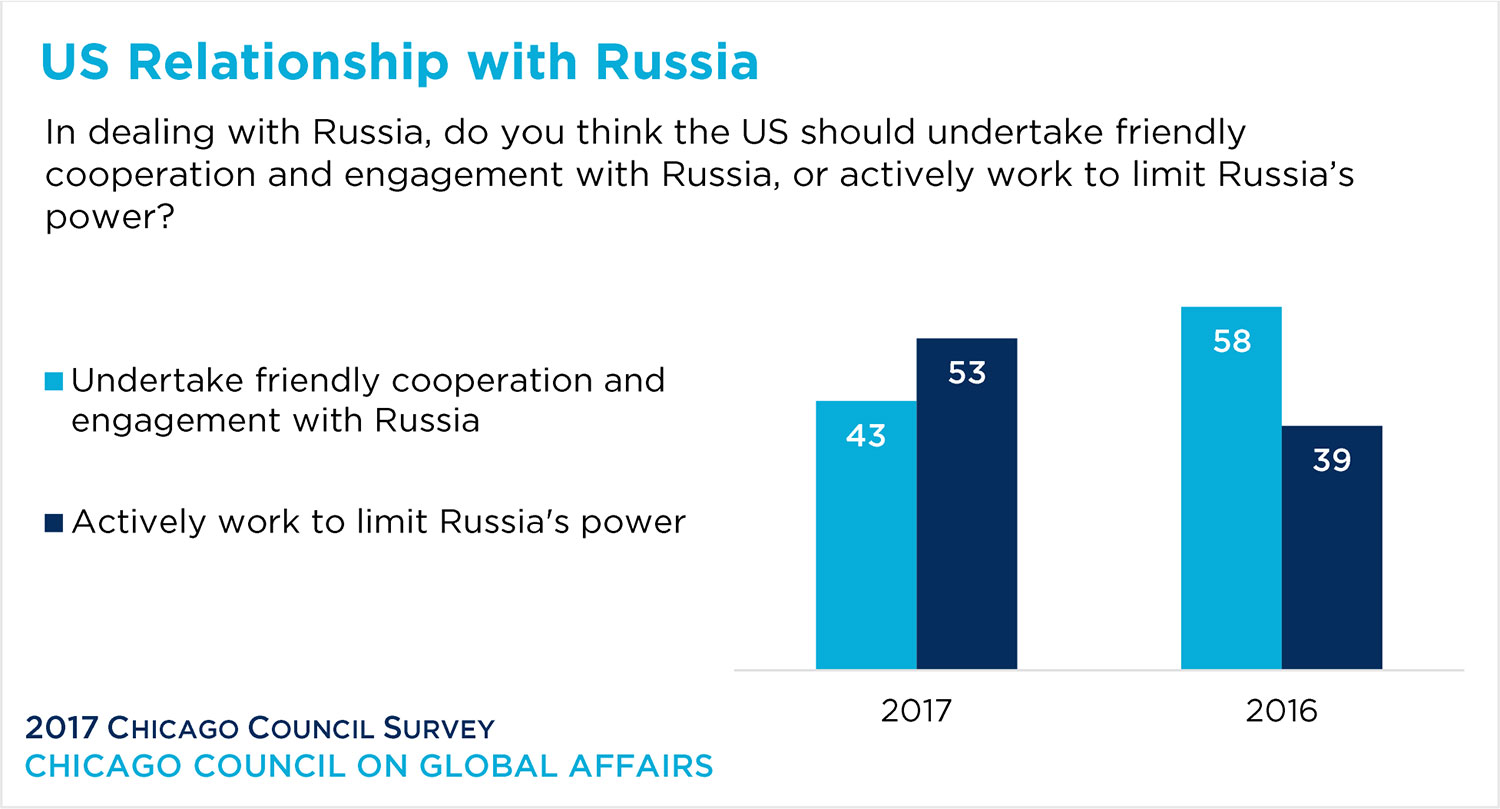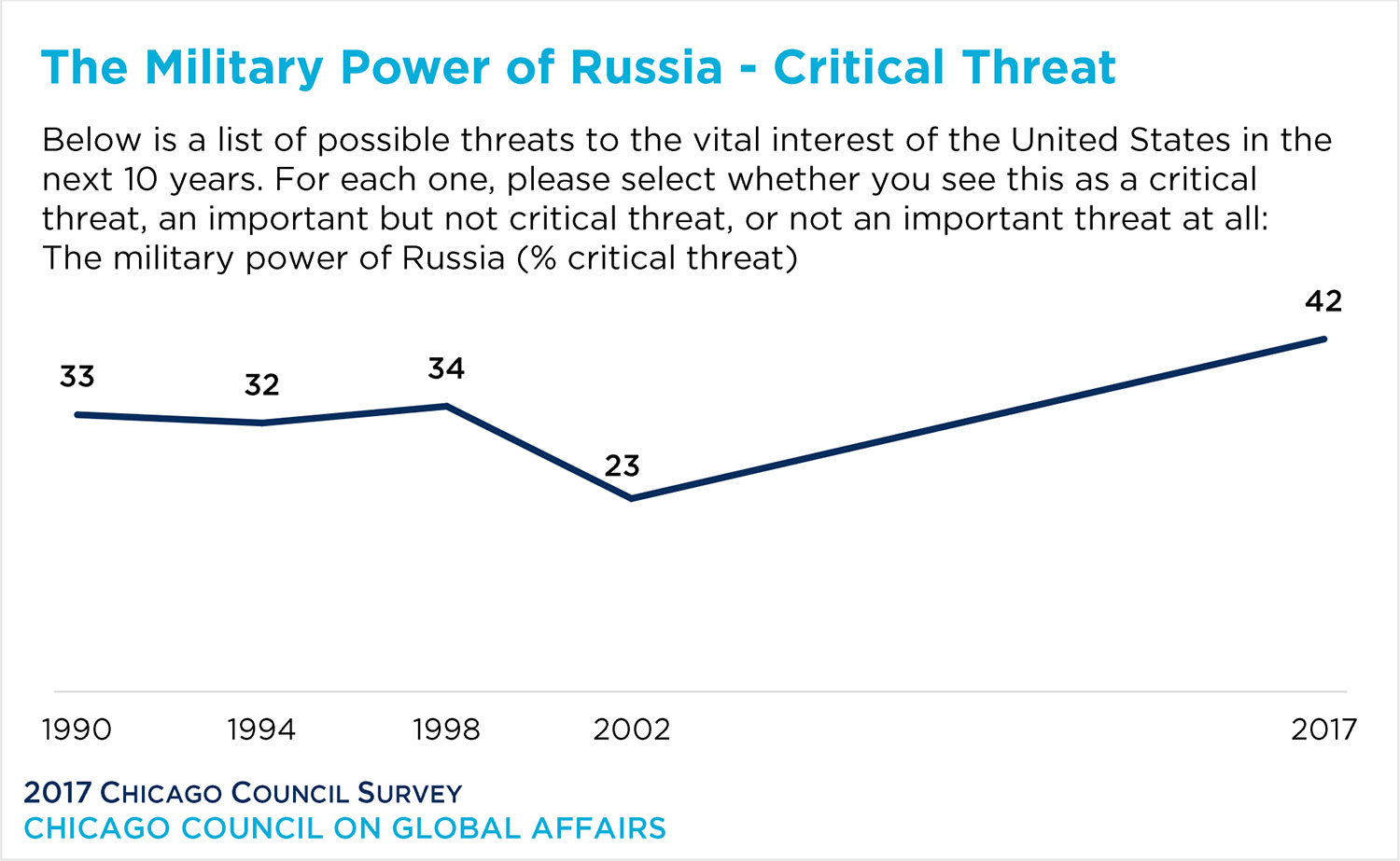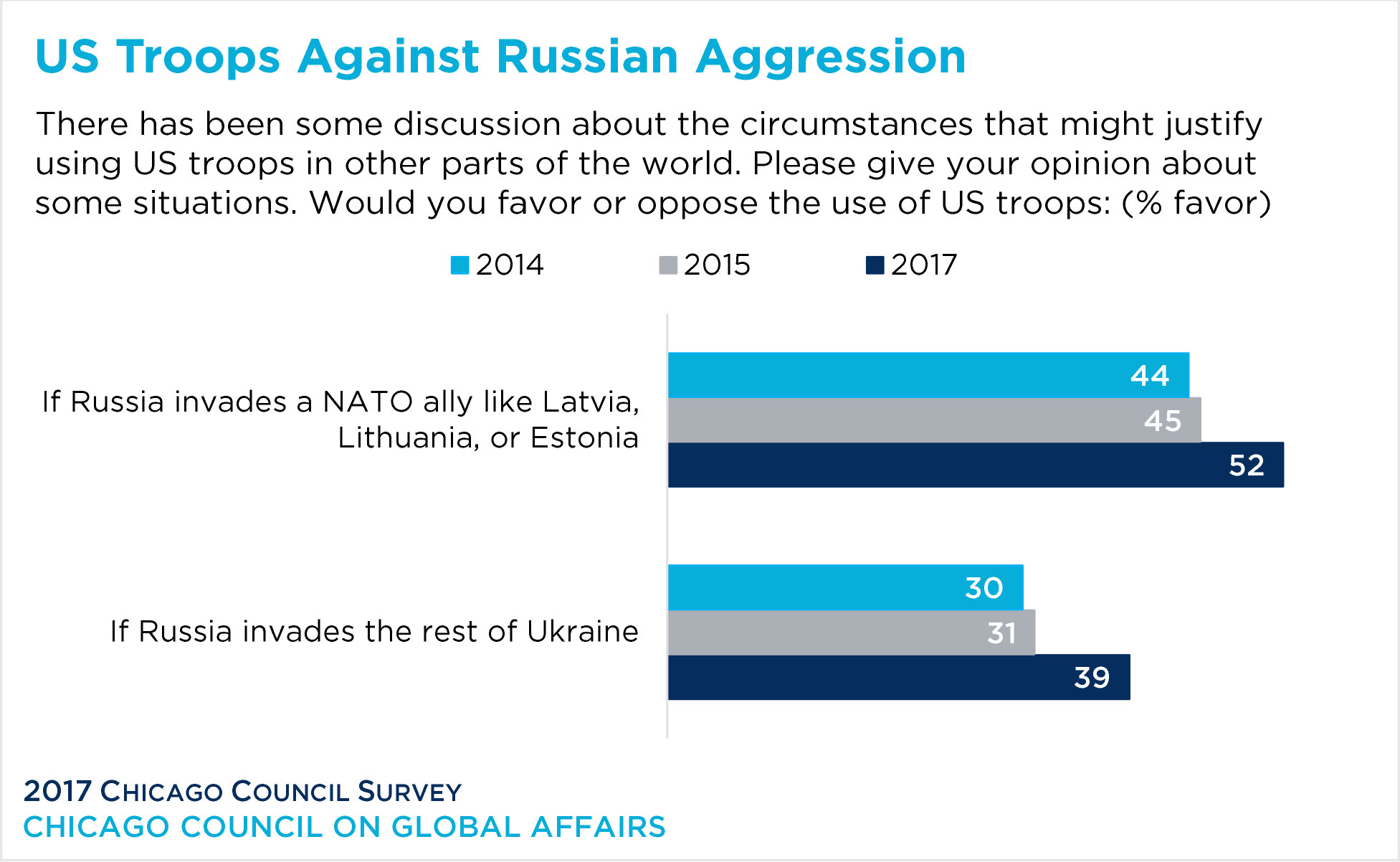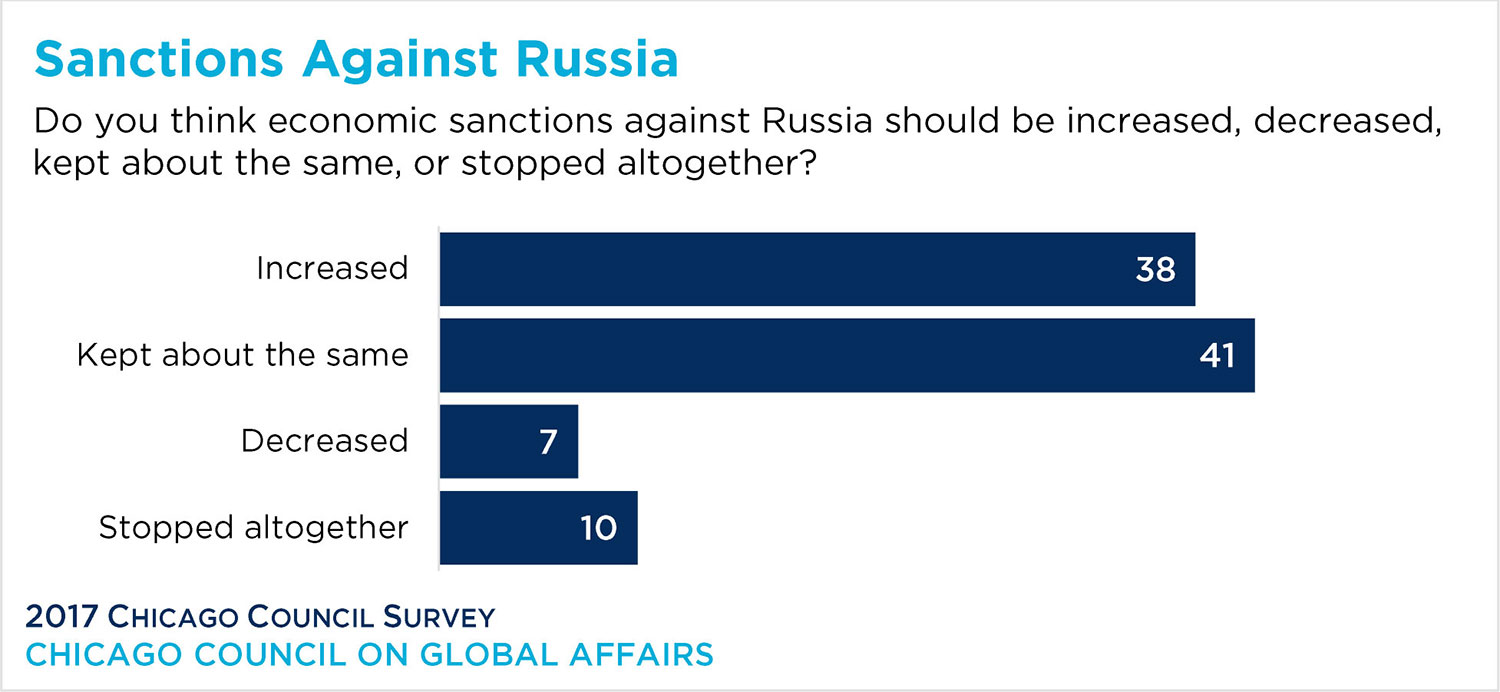New Chicago Council Survey results show a majority of Americans support maintaining or increasing sanctions against Russia and views the nation as a greater threat than in previous years.
Recently, the Russian government confiscated two US diplomatic properties in Russia and ordered Washington to cut its diplomatic and technical staff. This was done in retaliation for the US Senate's vote on July 27 to expand sanctions against Russia for interference in the US presidential elections. New Chicago Council Survey results show that the congressional move is in line with US public opinion: a majority of Americans support maintaining or increasing sanctions against Russia. Moreover, the US public senses a greater threat from Russia than in previous years, and is now more likely to favor actively containing Moscow.
Key Findings
- A slight majority of Americans now think the US should work to limit Russia's international influence (53%) rather than cooperate (43%), a reversal from preferences in 2016, when 58 percent favored cooperating and 39 percent thought the US should aim to contain Russia.
- The percentage describing Russian military power as a critical threat has increased (42%, 23% when last asked in 2002), and for the first time in Chicago Council surveys, a majority of the public would support using US troops to defend a Baltic NATO member if attacked (52%).
- A large majority support either maintaining (41%) or increasing (38%) sanctions against Russia, and 44 percent say that Russian influence in US elections is a critical threat to the United States.
In Contrast to 2016, Americans Now Support Containment over Cooperation
Not a week has passed in 2017 without Russia, or the Trump administration’s connection to Russia, making front-page news. One effect of the prominence of this story may be that Americans now view Russia as more influential today than in previous years (a mean of 6.5, returning to the high point registered in 2002). And in a stark reversal from last year, more Americans now say that the United States should actively work to limit Russia's power (53%, 39% in 2016) than undertake friendly engagement and cooperation with Russia (43%, 58% in 2016). In addition, confidence in Russia to deal responsibly with world problems remains low (28%, 27% in 2015).

Americans already believed that Russia was working to try to undermine American international power and influence (rather than undertaking friendly cooperation), according to 2016 Chicago Council Survey results. That majority has increased slightly this year (74%, up from 71% in 2016). Two in ten continue to believe that Russia is undertaking friendly cooperation and engagement with the United States (22%, 24% in 2016).
Growing Percentages Threatened by Russia, Support Defending Baltic Allies
Americans also sense a greater threat from Moscow, perhaps because of Russia's use of military force in Ukraine and Syria (despite Russia's actual military capability being but a fraction of what it was during the Soviet Union). While still only a minority, more Americans consider the military power of Russia to be a critical threat (42%) today than in any Chicago Council polls conducted since 1990. Another 51 percent say it is an important but not critical threat.

Americans are also more willing to defend NATO Baltic allies if Russia were to invade one of them. For the first time since the question was first asked in 2014, a slim majority now say they would favor sending US troops to defend Latvia, Lithuania or Estonia (52%). And a growing minority of Americans favor sending US troops if Russia invades the rest of Ukraine (from 31% in 2015 to 39% in 2017).

A Majority Support Either Maintaining or Increasing Sanctions Against Russia
Last week, the Senate passed a House bill that effectively restricts President Trump's capability to relax existing sanctions against Russia placed by the Obama administration and expands sanctions on Russian energy and arms sales. This congressional action coincides with US public opinion. Americans favor either maintaining (41%) or increasing (38%) the sanctions against Russia. Just 17 percent favor decreasing (7%) or ending (10%) the sanctions (4% declined to respond). Last January, a majority of Americans approved of the "new sanctions ordered by the US government against Russia in retaliation for alleged election interference" (56% approved, 30% disapproved), according to a Quinnipiac University survey.

Just over four in ten Americans say that Russian influence in US elections is a critical threat to the United States (44%), though recent poll results show that a majority believe Russia was involved. A July ABC News/Washington Post survey found that six in ten Americans (60%) think the Russian government tried to interfere with the 2016 presidential elections.
New Partisan Divides on Attitudes toward Russia
These data break down in a pattern revealed in other recent polls, with self-described Republicans more positive toward Russia than are Democrats. Republicans are far less likely than Democrats to describe Russia's military power (50% Democrats, 32% Republicans) and Russian influence in US elections (65% Democrats, 19% Republicans) as critical threats to the United States.
While Republicans have grown less likely to believe that Russia is working to undermine US influence (64% vs. 75% in 2016), Democrats have grown more likely to believe so (82% vs. 72% in 2016). In the same vein, Republicans are more likely to say that the US should undertake friendly cooperation and engagement with Russia (56% vs. 28% of Democrats), while Democrats are more likely to say that the United States should actively work to limit Russia's power (70% vs. 40% of Republicans). In 2016, the pattern was opposite, with Democrats more inclined toward cooperation than Republicans (62% Democrats vs. 50% Republicans) and only minorities favoring a containment approach (34% Democrats, 44% Republicans).
This helps to explain why Democrats are far more likely than Republicans to support increasing sanctions against Russia (51% Democrats, 29% Republicans). In addition, Republicans are now more supportive than Democrats of cooperating with Russia. In 2016, before Russian interference in US elections came to light, this pattern was reversed, Democrats were more willing than Republicans to cooperate with Russia (62% Democrats, 50% Republicans).
In dealing with Russia, do you think the United States should:
| Overall | Republican | Democrat | |
|---|---|---|---|
| Undertake friendly cooperation and engagement with Russia | 43% | 56% | 28% |
| Actively work to limit Russia's power | 53% | 40% | 70% |
Do you think that generally Russia is:
| Overall | Republican | Democrat | |
|---|---|---|---|
| Trying to undertake friendly cooperation and engagement with the US | 22% | 32% | 15% |
| Actively working to undermine US international power and influence | 74% | 64% | 82% |
Do you think economic sanctions against Russia should be:
| Overall | Republican | Democrat | |
|---|---|---|---|
| Increased | 38% | 29% | 51% |
| Decreased | 7% | 7% | 6% |
| Kept the same | 41% | 50% | 30% |
| Stopped | 10% | 9% | 11% |
Below is a list of possible threats to the vital interest of the US in the next 10 years. For each one, please select whether you see this as a critical threat, an important but not critical threat, or not an important threat at all: The military power of Russia
| Overall | Republican | Democrat | |
|---|---|---|---|
| Critical threat | 42% | 32% | 50% |
| Important, but not critical threat | 51% | 60% | 46% |
| Not an important threat | 7% | 7% | 4% |
Below is a list of possible threats to the vital interest of the US in the next 10 years. For each one, please select whether you see this as a critical threat, an important but not critical threat, or not an important threat at all: Russian influence in American elections
| Overall | Republican | Democrat | |
|---|---|---|---|
| Critical threat | 44% | 19% | 65% |
| Important, but not critical threat | 37% | 42% | 32% |
| Not an important threat | 18% | 38% | 4% |
Opinions of Russia Descending since 2014
Favorable views of Russia first dropped in 2014 after Russia annexed Crimea. When last asked in December 2016 after allegations that Russia interfered in US elections, American feelings toward Russia plunged to a chilly 32 degrees out of 100 possible on the Council’s temperature rating, down from an average of 36 degrees in 2014 and 48 degrees in 2010.
Gallup’s trend on Russian President Vladimir Putin shows a similar decline in the leader’s favorability, a steady decline since 2002 with a steep drop in 2014 just after Russia annexed Crimea (9%). While both the Council and Gallup have seen an increase in Putin’s popularity since 2014, his favorability remains below 20 percent (18% Council Survey, 13% Gallup in June).




